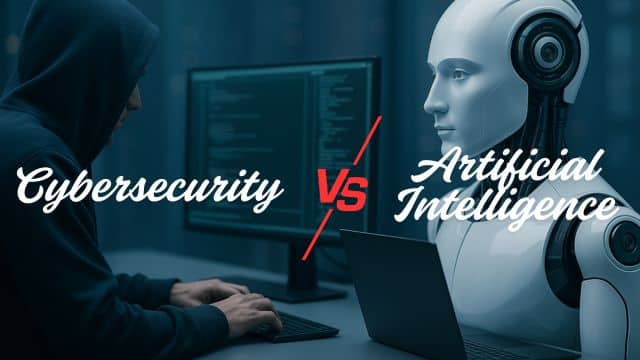These days, cybersecurity and artificial intelligence are two major tech fields that are crucial to the direction of technology and have a lot of room for growth. But occasionally, those looking to enter the tech industry or change careers wonder which is easy Cybersecurity or Artificial Intelligence, we will clear the confusion in this article.
In order to assist you in making a decision, this blog post will compare these two in terms of focus, the level of skill you require, learning speed, and employment opportunities.

What Is Cybersecurity ?
Cybersecurity, which includes the protection of digital systems, networks, and data, is crucial for the future of information technology as well as for preserving the availability, confidentiality, and integrity of data.
Among the crucial areas in the field of cybersecurity are:
- Network Security: Keeping networks safe from intrusions or abuse is known as network security.
- Ethical Hacking: Ethical hacking is the process of mimicking cyberattacks to identify security flaws in systems.
- Threat Analysis: Threat analysis is the process of locating and keeping an eye on possible dangers and threats.
To identify and address computer security issues, cybersecurity experts use tools like firewalls, vulnerability scanners, and software like Wireshark and Metasploit. People who enjoy problem-solving and are very interested in the inner workings of systems are drawn to this field.
Read Also: Cybersecurity Fundamentals: The Ultimate 2025 Guide to Stay Secure Online
What is Artificial Intelligence ?
The goal of artificial intelligence is to build machines that can function and think like people. This includes fields where algorithms learn from data to solve intricate problems, such as deep learning, machine learning, and natural language processing.
AI has a wide range of useful applications in daily life. For instance:
- Customer service chatbots.
- Recommendation engines on websites such as Amazon or Netflix.
- Autonomous systems and robotics are propelling industry innovation.
Among other tools and programming languages, Python, TensorFlow, and PyTorch are frequently used by AI professionals. Many intellectually curious people find the field difficult to pursue because it necessitates a thorough understanding of algorithms, data analysis, and mathematical concepts.
Which Learning Curve Is Easier to Enter?

Cybersecurity
Cybersecurity is frequently regarded as a better place for novices to start because it is very practical and hands-on. This is because it depends on fundamental understanding of networks, operating systems, and security concepts. Your confidence can be immediately increased, for instance, if you know how a firewall shields data from unwanted traffic or how to examine basic network packets. Additionally, you can specialize in a lot of entry-level cybersecurity positions without needing to know how to program.
AI
However, the initial learning curve for AI is higher. You need a strong foundation in mathematics, including probability and linear algebra, to get started. Gaining a comfortable level of proficiency in programming languages like Python also takes time. For some students, the occasionally sluggish progress in creating even basic predictive models can be discouraging, even though the outcomes of AI projects can be highly satisfying once they are realized.
People with little technical expertise may find cybersecurity easier to use, while people who enjoy math and analytical thought may find AI’s complexity more alluring.
Read Also: How to Start a Cybersecurity Business in 2025 | Tips, Costs, and Strategies
Demand and Career Paths
There are many job options in both fields, which have a thriving job market.
Cybersecurity Roles
- Security Operations Center (SOC) Analyst: Monitoring the systems to detect any negative activity.
- Penetration Tester (Ethical Hacker): An ethical hacker determines whether your company’s defenses can be breached by attacking them.
- Cybersecurity Consultant: Assist companies in determining the most effective security strategy.
Because of the increase in cyberattacks, cybersecurity professionals are needed in all sectors of the economy, but particularly in government, healthcare, and finance.
Roles of AI
- Data Scientist: Making decisions based on data.
- Machine Learning (ML) Engineer: Create and implement algorithms for predictive tasks.
- Researcher of Artificial Intelligence: Develop new AI instruments and technologies.
Experts in AI are frequently the ones advancing science, particularly in domains like biotechnology and driverless cars.

Comparison of Salary
Although both professions pay well, your earnings will be based on your role and level of experience:
Pay for Cybersecurity (USA)
- Entry-Level: between $60,000 and $85,000
- Mid-Level: between $90,000 and $120,000
- Senior Positions: Over $130,000
AI Pay (USA)
- Entry-Level: between $80,000 and $110,000
- Mid-Level: $120,000 to $160,000
- Senior/Research Positions: $160,000–$200,000+
Please take note that all salaries are estimates that may change depending on industry, region, and personal experience. Because AI positions require advanced skills, they typically have slightly higher earning potential.
Demand in the Industry and Employment Prospects
These two fields show no signs of slowing down:
- Cybersecurity: The Bureau of Labor Statistics projects that employment in the cybersecurity sector will increase by 32% between 2022 and 2032, which is significantly faster than the average growth rate for all occupations. Cybersecurity experts are more needed than ever in sectors like government, healthcare, and finance due to the rise in cyberattacks.
- AI: Jobs involving AI are currently expanding at a rate of more than 40% per year, especially in the automation, fintech, and healthcare sectors. The industry continues to attract substantial investment due to the advancement of autonomous systems and AI-based decision-making.
Obstacles in the Field

Every career faces a unique set of challenges. They are as follows:
Cybersecurity
- Keeping up with increasingly sophisticated cyberthreats.
- Working under pressure, such as when systems are hacked or data leaks.
- How can one adhere to rules and regulations in a way that is both ethical and legal?
AI
- Overseeing the data preprocessing phase and guaranteeing high-quality data.
- Resolving the model interpretability problem and guaranteeing moral AI application.
- Overcoming computational requirements that demand a lot of resources.
Actual Success Stories
Cybersecurity
One of the most well-known cybersecurity events occurred when a team of white-hat hackers discovered a significant weakness in the computer system of a multinational financial services company. They collaborated with the business to stop losses totaling millions of dollars and potentially avoiding harm to their reputation.
AI
The 50-year-old grand challenge of protein folding was resolved by AlphaFold, an AI system created by Google’s DeepMind team in December 2020. It is anticipated that this discovery will speed up the process of finding new drugs and understanding diseases.
Is It Possible to Switch Between the Two?
Although the skills needed for cybersecurity and AI differ, there is some overlap that makes switching between them possible:
- Common Skills: Data analysis, Python programming, and system knowledge are useful in both domains.
- AI in Cybersecurity: Machine learning and other AI technologies are used by many contemporary cybersecurity tools for threat detection and predictive analysis.
- Upskilling Advice:
- To learn AI concepts, a cybersecurity professional should begin with the fundamentals of machine learning before progressing to more sophisticated data science tools.
- Network security and ethical hacking certifications are available to AI professionals who wish to work in cybersecurity.
Key Comparison

| Category | Cybersecurity | Artificial Intelligence |
|---|---|---|
| Focus | Preventing unwanted access to and damage to digital networks, systems, and data | Constructing intelligent systems that replicate human decision-making and behavior |
| Competencies Needed | Knowledge of operating systems, networks, and threat analysis; little programming knowledge is required | Strong foundation in mathematics (such as probability and linear algebra) and Python programming |
| Simpleness of Beginning | Basic technical knowledge and practical experience make it easier to get started | Steeper learning curve due to the requirement for sophisticated mathematical and algorithmic skills |
| Tools Used | Firewalls, vulnerability scanners, Metasploit, and Wireshark | TensorFlow, PyTorch, and Python (ML libraries) |
| Uses | Data protection, ethical hacking, and network security | Predictive analytics, robotics, recommendation systems, and chatbots |
| Employment Possibilities | Cybersecurity Consultant, Penetration Tester, and SOC Analyst | AI researcher, machine learning engineer, and data scientist |
What Should You Choose? Select AI or Cybersecurity?
Your decision will ultimately depend on your interests, future goals, and skill set.
AI might not be the best option for you if you prefer practical, hands-on work and dislike math. For people who want to work in technology and enjoy solving issues related to system vulnerabilities, network security, etc. but don’t want to spend their days coding, cybersecurity is a good option.
For those who already have a solid foundation in math and programming and who enjoy data, algorithms, and innovation, AI is a better fit. If this sounds like you, artificial intelligence (AI) is a fascinating field where you can work on current innovations like self-driving cars.
In Conclusion
Despite the fact that both cybersecurity and artificial intelligence are very profitable, cybersecurity is much easier to enter because of its practical nature and focus on system security. This is a good place for people who are new to technology or don’t have any programming experience. More intellectual stimulation is offered by AI, but for it to advance significantly, a more comprehensive technical background in math and statistics is needed. You can safeguard or forecast your path to a bright future, so make your decision based on your abilities, passions, and long-term.
Read Also: Claude AI vs ChatGPT: 2025 Comparison of Features, Pricing & Safety


